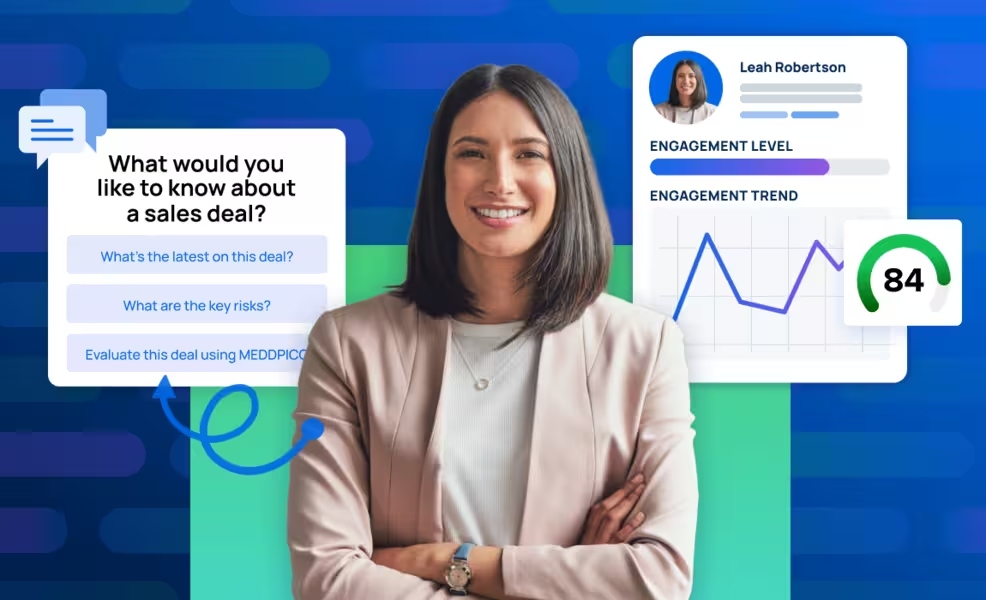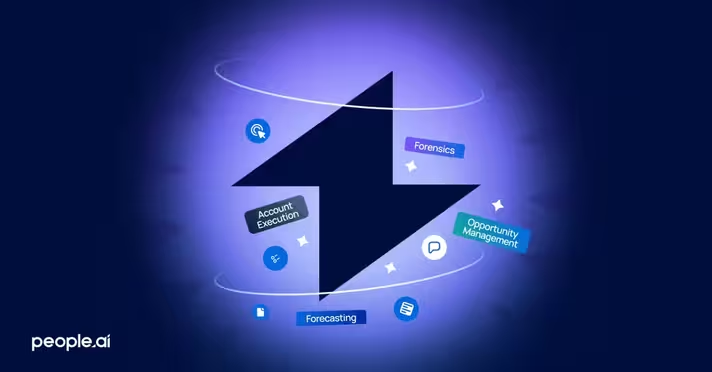Despite digital transformation across other teams like engineering and marketing, the sales profession fundamentally hasn’t changed since I began my career two decades ago. Research shows that since 2000, 52% of companies in the Fortune 500 have either gone bankrupt, been acquired, or ceased to exist as a result of digital disruption. Companies of the future recognize they must adopt this now and ingrain it into their DNA to stay competitive.
Over the next several years, Artificial Intelligence (AI) is poised to shape how sales organizations operate, align with cross-functional teams, and manage reps. We as sales leaders have an opportunity to leverage these AI-powered go-to-market insights today—and if we don’t, we not only will fall behind our competitors, but we won’t be able to deliver the experience our customers expect.
Here are a few ways that I believe AI will impact sales organizations.
1. Increased Productivity Through Insights and Better Information
According to a recent survey that People.ai conducted with Harvard Business Review (HBR), 51% of large companies expect AI to automate manual processes over the next three years. For example, AI can automatically enter new contacts, emails, phone calls, and calendar information into the CRM, ensuring that sales teams have timely and accurate customer data.
By eliminating this tedious administrative work, AI can help salespeople focus on what they do best—driving growth. One company surveyed found that after automating manual CRM data entry, they saw a 15% increase in bookings per sales rep.
It isn’t just automation. Another part of the productivity story is augmentation and how these AI-driven insights provide the best next action for the sales rep. This doubles the productivity boost, enables the rep to get something back by guiding them to be more successful with that data.
2. More Complete Engagement Data = Better Forecasting
Forecasting isn’t just about better visualization. Today, it’s still missing a key data set. Today, many sales leaders still hold a weekly forecast call asking their team questions like “What did you do last week?” “What are the risks?” “Have you talked to the right people?” These conversations are based on storytelling, not data, which becomes a problem when reps miss their numbers and, in the aggregate, impact the forecast for the entire organization.
With AI, sales leaders will no longer have to estimate their team’s numbers themselves—they’ll be able to rely on algorithms and key buyer and seller engagement data to predict the next quarter’s revenue with a higher degree of accuracy. This will help sales organizations understand where to focus their resources, communicate any risks to the broader company leadership and take a data-informed best path of success.
3. Using AI-Driven Insights to Ensure Sales is Focusing on the Right Actions
By analyzing data from emails, calls, and collaboration tools, AI-powered technologies can help sales teams prioritize tasks that are most likely to drive value. For example, you can determine that in order to close a deal with a certain prospect, sales reps need to bring in the prospect’s CFO at stage three of the selling process. Armed with that knowledge, marketing can launch a campaign to target CFOs early in the buying process.
As AI advancements continue, we’ll have access to even deeper data insights, such as analyzing an email’s sentiment or tone, rather than just the number of emails sent.
4. Automation will Bridge the Sales and Marketing Gap
While there’s usually some alignment between sales and marketing—they’ve hopefully agreed on target accounts, personas and priority segments—much of it happens during in-person meetings versus a free-flowing data system that informs each group in real-time.
The same HBR study found that 82% of large companies believe AI has the potential to significantly improve alignment between sales and marketing. AI introduces accountability for both teams, eliminating confusion and actively helping marketers accelerate sales. Ultimately, marketing’s success is reliant on sales; by having access to valuable sales insights, marketing gets real-time feedback without having to ask the sales team, and the sales team gets a 360-degree view of every prospect’s journey.
5. What World-Class Sales Teams of the Future Need
The old paradigm of calling a forecast based on gut feeling or relying on relationships to make your number is disappearing. Monitoring sales reps’ activities will help sales leaders encourage top-performers and while providing coaching and training to low-performers. The single biggest benefit of data-driven coaching, cited by 43% of large company HBR survey respondents, was to set goals and benchmark activities based on the team’s top performers. The second-best benefit, noted by 36% of large companies, was to determine if sales reps were talking to the right people.
When half of the on-target earnings are variable, it’s up to sales reps to make their number. And if data can help them get an edge, they’ll be receptive to this new standard.
AI won’t replace salespeople but instead will free them to focus on the work that is more valuable and meaningful. Rather than worrying about whether we’ll have fewer sellers in the future, sales leaders should focus on how AI can help organizations re-engineer business processes and eliminate manual tasks to be more efficient and productive. Being able to focus on higher-value work will also result in more engaged employees.
Data-informed coaching is key ingredient for faster ramp time and higher attainment. This is what creates happy salespeople.
Conclusion
When I talk to sales leaders around the globe and across industries, they know that their customers are more informed than ever and that you have to match them. It’s clear that they feel this reality is now upon us. They view a world where sales reps aren’t logging into anything—data insights and the best action based on their role and the product they’re selling is automatically pushed to them. Days of relationship selling are over because customers are so informed. Industry at large is more informed, the sales team needs to up it’s game to match the sophistication of the buyer.
Companies that begin their AI journey today will have a leg up on their competitors—and those who don’t will find themselves left playing catch-up, trying to keep up with evolving customer expectations.
Related Insights
Explore more expert insights on AI adoption, sales execution, and revenue intelligence to help your team close more deals with confidence.



